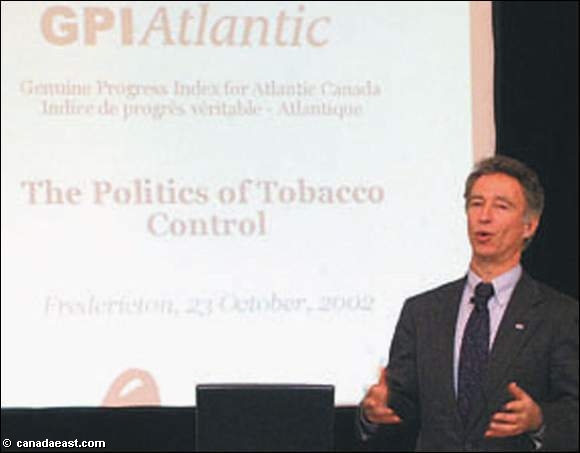| The GPI | Research | Media Gallery | About Us | Youth | Members | Resources |
|
Media Clipping — October 24, 2002, New Brunswick Telegraph-Journal ~ HEALTH Smokers will soon be able to phone for help quittingAnti-tobacco coalition unveils initiatives, including helpline, Web site By Roger LeBlanc Getting information on the benefits of butting out just got a whole lot easier. At the annual general meeting of the New Brunswick Anti-Tobacco Coalition (NBATC) Wednesday, new initiatives were unveiled, including a toll-free telephone helpline, a comprehensive Web site and a co-ordination of all medical professionals. Debbie Flynn, who until recently served as the director of health initiatives for the New Brunswick Lung Association, said the coalition's clinical tobacco intervention program, which is aimed at doctors, pharmacists, dentists, nurses and all their assistants, is an important first step. The goal is to have one central message being sent from health-care professionals to patients who smoke. "It's been proven a repeated message can increase benefit," Ms. Flynn said. "Then we offer a whole range of initiatives that can help them: pamphlets from the Canadian Cancer Society if that's what they want or the smokers' helpline if they want anonymous counselling. "The whole component from the doctors' perspective of wanting to get involved and not knowing quite how in a co-ordinated effort, the whole effort of a quit line has been a major gap," she admitted. The telephone helpline, said the Canadian Cancer Society's Lousie Walker, won't just strive to convince people to quit, it will also help smokers prepare to quit and stay off tobacco. As of Nov. 1, people can get confidential advice in either official language for smokers, their friends or family by dialling 1-877-513-5333. While information is helpful, experts have often said continued follow-up care and advice is crucial. That's why the helpline includes the option of having specialists call back at regular intervals. As well, the focus for anti-tobacco crusaders recently has been on preventing youth from starting the habit in the first place, which is why these moves will have youth components. "The service has been designed to target different populations. We have specific information for youth, pregnant smokers, or someone calling to help a family member quit," Ms. Walker said. It's important to keep youth from starting, Ms. Walker noted, but it's also important to have adult smokers quit now to dodge massive health-care costs in the next 15 years. The coalition also launched its Web site Wednesday. At www.nbatc-actnb.org, Web surfers can now find tobacco reduction strategies, research, best practices, news and links. These initiatives will work in conjunction with programs in the schools and soon-to-come smoking on school grounds rules, Ms. Flynn said. The coalition's literature says tobacco use kills 1,300 New Brunswickers annually. As well, people here smoke more cigarettes per day than other Canadians at a rate of 19 cigarettes. Data presented at the meeting by researcher GPI Atlantic also showed a total of 27 per cent of all New Brunswickers smoke, with 21 per cent of New Brunswick workers being exposed to second-hand smoke and 26 per cent of children exposed to second-hand smoke.
"There's always a long way to go. But we've made big strides and we're quite proud of them," Ms. Flynn said.
Copyright © 2002, New Brunswick Telegraph-Journal
|
| ||||||||||||||||||||
| The GPI | Research | Media Gallery | About Us | Youth | Members | Resources |
| Updated: 14-sep-07 webmaster@gpiatlantic.org | ||||||
|---|---|---|---|---|---|---|
 Dr. Ronald Colman gives a lecture on the politics of tobacco control to the New Brunswick Anti-Tobacco Coalition conference in Fredericton Wednesday.
Dr. Ronald Colman gives a lecture on the politics of tobacco control to the New Brunswick Anti-Tobacco Coalition conference in Fredericton Wednesday.

